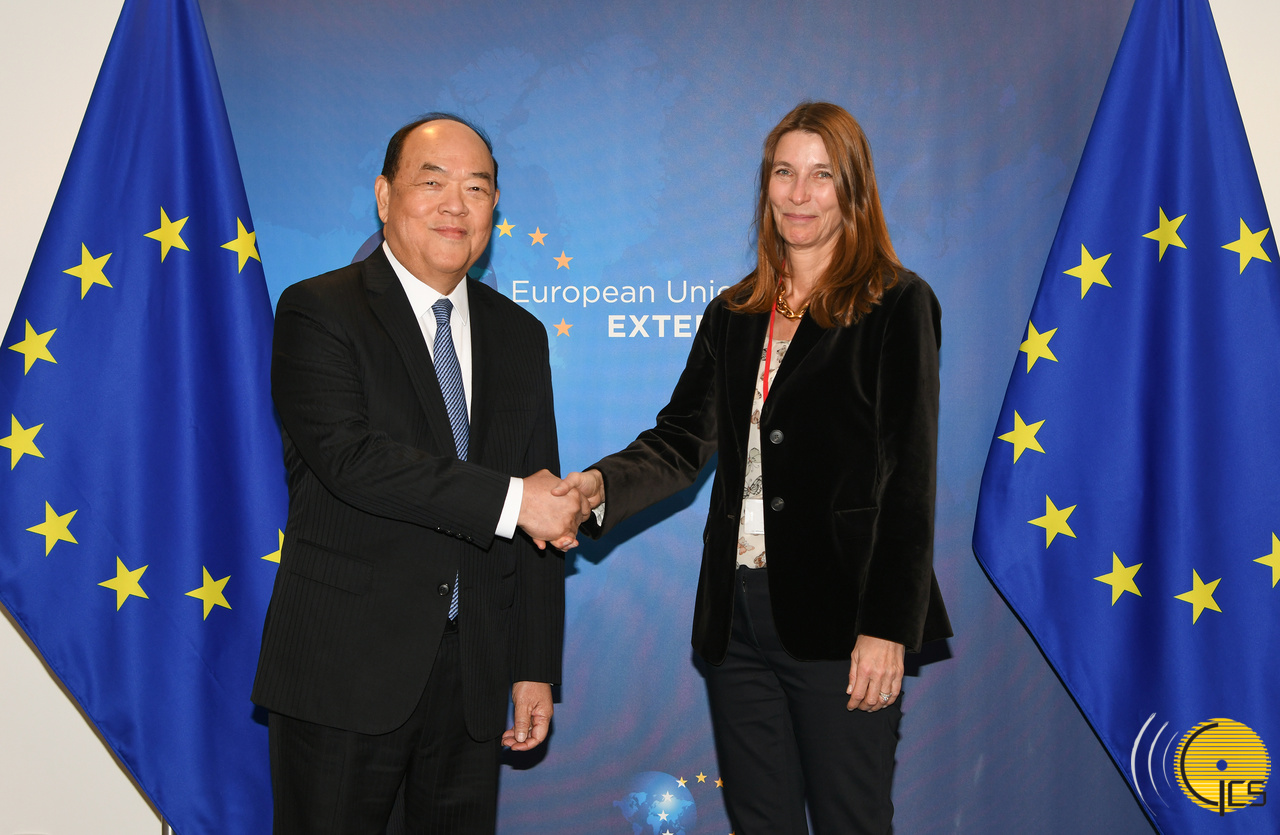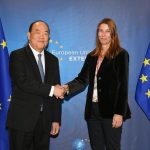 The Chief Executive, Mr Ho Iat Seng, cordially shakes hands with Deputy Secretary-General for Economic and Global Issues of the European Union's European External Action Service (EEAS), Ms Helena König, during a meeting held in Brussels, Belgium.
The Chief Executive, Mr Ho Iat Seng, cordially shakes hands with Deputy Secretary-General for Economic and Global Issues of the European Union's European External Action Service (EEAS), Ms Helena König, during a meeting held in Brussels, Belgium.
While in Brussels, Belgium, the Chief Executive, Mr Ho Iat Seng, met with Deputy Secretary General for Economic and Global Issues for the European External Action Service (EEAS) of the European Union (EU), Ms Helena König. The two officials exchanged views on topics including the strengthening of trade cooperation between Macao and the EU, and post-pandemic economic recovery.
A Macao Special Administrative Region (MSAR) Government delegation, led by the Chief Executive, is to return to Macao in the evening on Thursday (27 April), after a 10-day trip covering three countries in Europe, namely Portugal, Luxembourg, and Belgium.
Mr Ho thanked Ms König for arranging the meeting. He invited those present to come to Macao, to learn for themselves about the latest developments for the city. Macao has successfully implemented the “One country, two systems” principle; fundamental rights of the city’s residents enshrined under the MSAR Basic Law have been fullyguaranteed, and Macao’s society has maintained its harmony and stability, stressed Mr Ho.
The Chief Executive briefed Ms König on the current situation and development direction of Macao. During the three years of the COVID-19 pandemic, although the local economy had been severely hindered, the MSAR Government had launched a series of welfare measures to support the city’s people in overcoming difficulties. This was in addition to regular benefits enjoyed by the public. The aid introduced during the pandemic included electronic consumption benefit schemes, which had helped relieve the pressure on the public that was associated with everyday living, and had maintained social stability.
The MSAR Government was adopting a “1+4” strategy to support Macao’s appropriate economic diversification, and the revitalisation of tourism in the local market, while advancing overall economic recovery. Such a strategy aimed to enrich Macao’s function as “One Centre” for integrated tourism and leisure, while facilitating the development of four nascent industries, namely: “Big Health”; modern financial services; high and new technology; and convention and exhibition, sports, and the commercial and trade industries.
The EU was the second-largest trading partner of Macao, noted Mr Ho. Entrepreneurs from EU member states were welcome to seek business opportunities in the Guangdong-Hong Kong-Macao Greater Bay Area, and the Guangdong-Macao Intensive Cooperation Zone in Hengqin. Mr Ho presented detailed information regarding the current development progress in, and future prospects of, the Greater Bay Area and the Cooperation Zone. The two sides had comprehensive exchanges on issues of mutual concern.
Ms König welcomed Mr Ho’s visit, and noted the meeting was productive. Advancing post-pandemic economic recovery globally was of great significance, she added.
Macao was an important partner of the EU, and the two sides should continue to strengthen cooperation in commercial and trade matters. Such partnership should also extend to the Cooperation Zone, and other cities within the Greater Bay Area, added Ms König.
The Head of the Chinese Mission to the European Union, Ambassador Mr Fu Cong; Macao’s Secretary for Transport and Public Works, Mr Raimundo do Rosário, and the Chief-of-Office of the Chief Executive’s Office of the MSAR, Ms Hoi Lai Fong, were present at the meeting.
Other officials representing the EU in the meeting were: Political Assistant of the EEAS Deputy Secretary-General for Economic and Global Issues, Ms Suvi Roponen; and Head of EEAS’s Division for China, Mr Dominic Porter.



